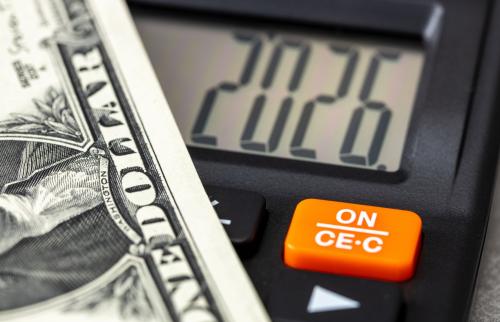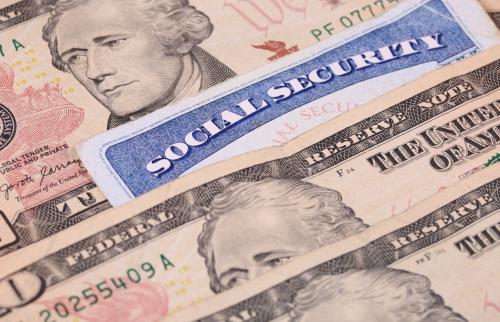While the government has been busily bailing out the private sector, few people seem to be worrying about who’s going to bail out the U.S. government when our creditors tire of lending us so much money. The nation’s fiscal imbalances are already driving up interest rates, which could imperil economic recovery. So, as Fed Chairman Ben Bernanke warned recently, it’s time for Congress and the administration to get serious about how we are going to get our fiscal house in order once the recession is over.
Ironically, just last month it started raining down checks from the Treasury on virtually all of us who are over the age of 65, regardless of whether or not we needed the money, thereby adding to the deficit. Our additional $250 good fortune, as beneficiaries of Social Security, Medicare, or any number of other government entitlement programs, came courtesy of the American Recovery and Reinvestment Act (aka, the stimulus).
The idea is that most of the money will be spent and thus help to end the recession, a worthy objective. Some seniors of course do need the extra money to pay the electric bill or its equivalent, given these tough economic times. The electric company will thank them for spending it, and more important, so will all the people who might otherwise have lost their jobs as the result of a deeper recession.
But not all of the money will be spent. Many seniors have more than enough money to live on, and will save the money instead of spending it, doing nothing to help end the recession. My own check was deposited directly into my bank account with the result that I wasn’t even aware that it had come. For those of you, who like me, are planning on simply squirreling away the money in a bank or brokerage account, I have a better idea. Set up, or add to, a savings account for a grandchild and send an e-mail to your elected representatives and others to let them know that citizens like you are concerned about our national profligacy. You will not only be doing a good deed for a future debt-burdened generation, you will be sending a message to Congress and the administration that they need to start thinking about the pernicious mountain of debt we are leaving to our children and grandchildren.
As someone who has spent an inordinate amount of time talking about the need to put our long-term fiscal house in order, I have been frustrated by how little impact all of this talk has had. Sadly, year after year, our elected leaders in Congress and the White House — regardless of which party is in charge — have put off the task of bringing spending and revenues into better balance.
In the 1990s, when I was a White House budget official, we actually had surpluses in the federal budget. But since that time, we have put just about everything on the national credit card. And like any credit card, we are paying interest … but in this case, much of it to foreign countries, many of whom don’t even like us very much. Recently, we have borrowed to fund the Bush tax cuts, the Medicare drug bill (another costly give-away to my generation), the war on terror, the financial and auto bailouts and spending packages to help prevent or hasten the end of the recession.
While President Obama inherited a big fiscal hole, he is digging it deeper than his predecessor. Yes, he should be applauded for holding a Fiscal Responsibility Summit and talking about a new era of responsibility, but his attempts at actually putting the pedal to the metal have been largely symbolic thus far. First, he called his Cabinet together and asked them to immediately cut $100 million, which is the equivalent of removing one drop from a glass of water. Ridiculed by many for this exercise, he followed up with a second attempt, in this case asking federal agencies to cut $17 billion — a very small sip of water from that same glass.
This year, the deficit will be $1.8 trillion and the national debt as a proportion of GDP is projected to double between 2008 and 2019 under the president’s proposed budget — primarily because of the continued growth of spending on entitlements and an unwillingness to raise taxes to pay for them. While I believe that large deficits are appropriate in a time of recession because the government is the only spender left in town to make up for the private-sector contraction, I also believe that actions should be taken now to shore up our longer-term fiscal situation, restore confidence among our increasingly nervous creditors (primarily the Chinese), prevent another economic crisis down the road, and leave a better fiscal legacy to the next generation.
In the end, just wringing our hands won’t do. Talk is cheap. But if enough of us who are members of the Greatest Generation don’t need the $250 windfall from the Treasury, and if we were to band together and actually put our money where our mouth is by saving it for future generations, imagine what kind of message that would send to the White House and Congress?
With today’s hyperactive blogosphere, we might even start a viral revolution in which thousands of people committed to an investment in the next generation. Such an investment would help our grandchildren pay all those bills that we have heaped onto the national credit card — bills that they will have to pay some day. Pay now or pay later is not just a slogan. It’s going to hit the younger generation with a vengeance.
So give it a shot. If you don’t need to spend your $250, put it in a special account for a grandchild or some other deserving youngster. And let your representatives in Washington know what you have done to combat generational irresponsibility in your own very personal way.
Sawhill, former associate director of the Office of Management and Budget under President Clinton, is a senior fellow at the Brookings Institution and director of its Budgeting for National Priorities project.
Take our survey on these $250 checks here »
The Brookings Institution is committed to quality, independence, and impact.
We are supported by a diverse array of funders. In line with our values and policies, each Brookings publication represents the sole views of its author(s).



Commentary
Op-edStop Kicking the Fiscal Can Down the Road
June 11, 2009